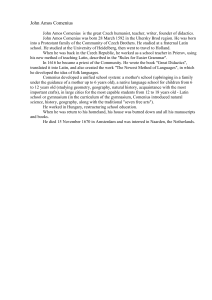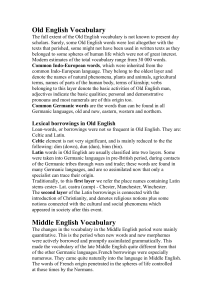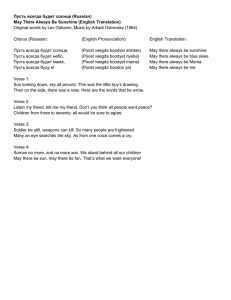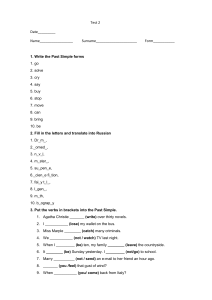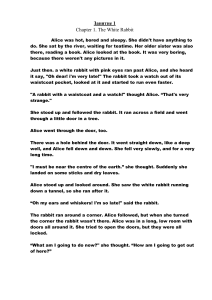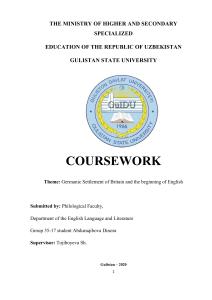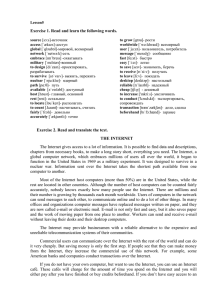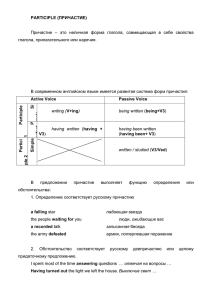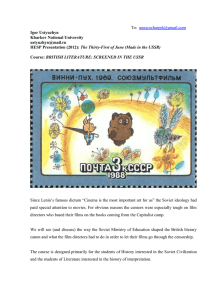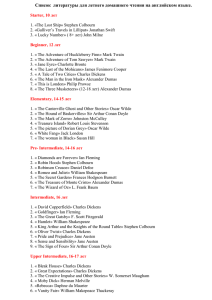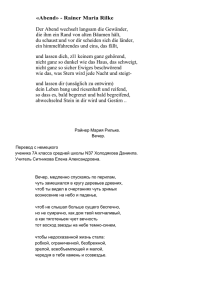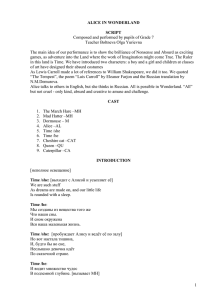Задания для студентов з/о социологического факультета (спец
реклама
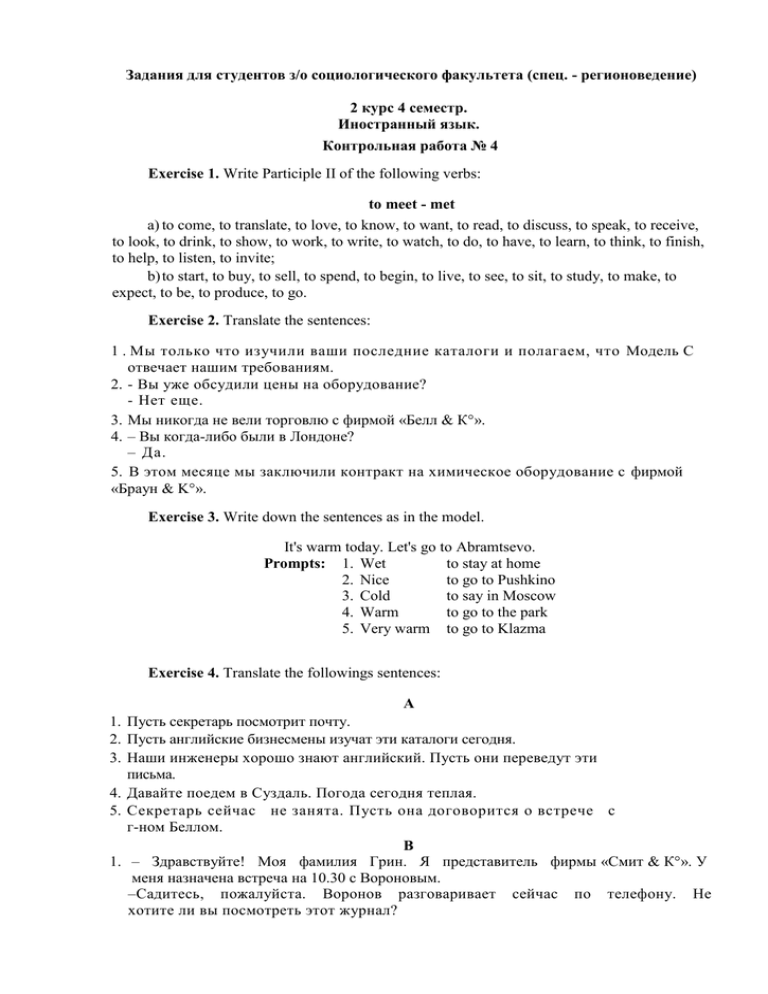
Задания для студентов з/о социологического факультета (спец. - регионоведение) 2 курс 4 семестр. Иностранный язык. Контрольная работа № 4 Exercise 1. Write Participle II of the following verbs: to meet - met a) to come, to translate, to love, to know, to want, to read, to discuss, to speak, to receive, to look, to drink, to show, to work, to write, to watch, to do, to have, to learn, to think, to finish, to help, to listen, to invite; b) to start, to buy, to sell, to spend, to begin, to live, to see, to sit, to study, to make, to expect, to be, to produce, to go. Exercise 2. Translate the sentences: 1 . Мы только что изучили ваши последние каталоги и полагаем, что Модель С отвечает нашим требованиям. 2. - Вы уже обсудили цены на оборудование? - Нет еще. 3. Мы никогда не вели торговлю с фирмой «Белл & К». 4. – Вы когда-либо были в Лондоне? – Да. 5. В этом месяце мы заключили контракт на химическое оборудование с фирмой «Браун & K». Exercise 3. Write down the sentences as in the model. It's warm today. Let's go to Abramtsevo. to stay at home Prompts: 1. Wet 2. Nice to go to Pushkino 3. Cold to say in Moscow 4. Warm to go to the park 5. Very warm to go to Klazma Exercise 4. Translate the followings sentences: A 1. Пусть секретарь посмотрит почту. 2. Пусть английские бизнесмены изучат эти каталоги сегодня. 3. Наши инженеры хорошо знают английский. Пусть они переведут эти письма. 4. Давайте поедем в Суздаль. Погода сегодня теплая. 5. Секретарь сейчас не занята. Пусть она договорится о встрече с г-ном Беллом. В 1. – Здравствуйте! Моя фамилия Грин. Я представитель фирмы «Смит & К°». У меня назначена встреча на 10.30 с Вороновым. –Садитесь, пожалуйста. Воронов разговаривает сейчас по телефону. Не хотите ли вы посмотреть этот журнал? –С удовольствием. –Вот, пожалуйста. –Спасибо. 2. Воронов работает в «Росэкспорте». Эта фирма продает машины во все страны. Машины «Росэкспорта» высокого качества и отвечают требованиям заказчиков. Недавно наши заводы начали выпускать новую модель, и в этом месяце «Росэкспорт» получил несколько заказов. На этой неделе «Росэкспорт» получил запрос на эти машины от «Блэк & К°». Заказчики заинтересованы в покупке 20 машин у российской фирмы. Г-н Хэролд (Harold), управляющий фирмы «Блэк & К°», хотел бы встретиться с нашим ^инженерами, чтобы обсудить некоторые вопросы и получить типовой контракт «Росэкспорта». Основной язык изучаемого региона. 1. Translate the text. Make up seven questions to it. TEXT 5 When John Milton, the great English poet, became a student of Cambridge University in 1625, he already knew Latin very well after seven years of studying it as his second language al school in London. Like all English boys who prepared for university in school he learned not only to read Latin but also to speak and write it. That was necessary because all textbooks were in Latin, university lectures were also given in Latin. It was difficult to learn Latin, but the schoolboys worked hard. To remember the rules of the language, they tried to learn them by heart, often in verse. When they began to read easy Latin, they learned the nouns and the verbs. They first made a word for word translation and then an idiomatic translation into English. Then they translated their English text into Latin without using the book, and after that they compared their translation with the Latin text. The teacher always "helped" them with a ruler in his hand. After some years of study, eight hours a day, five days a week, the boys began to imitate Latin authors they read, and they even began to compose verses in Latin. Milton was already a poet at ten and his verses were better than the verses of the other boys. In the fifth year at school the boys began to study Greek, to translate Greek into Latin, and to compose prose and poems in Greek. Good knowledge of English was necessary too. First the hoys composed prose and verses in English and then they translated them into Latin. During the seven years which Milton spent at the university he learned Latin very well and used it. He wrote Latin poetry, which was published in 1645. He even made some speeches in Latin, which were also published. 2. Translate the text. Make up seven questions to it. TEXT 6 Lewis Carroll Lewis Carroll was the pen-name of Charles L. Dodgson, the man who wrote a famous book for children "Alice's Adventures in Wonderland". Charles L. Dodgson was born in England in 1832. He got his early education at a public school. Then he became a student at Oxford. Charles studied mathematics and later taught this subject in the same college. Charles Dodgson had no family, but he loved children very much. He often visited his friend Mr. Liddell, who had a large family. There were three little girls in the family. One of them, Alice, was four years old, Dodgson liked Alice very much and he often told her interesting stories which he made up himself. Charles told Alice Liddell about the adventures of a little girt, and she liked the stories very much. When Alice Liddell was about ten years old, she asked Charles to write down the stories for her, and he did so. He called the heroine of his book also Alice. This hand-written book had many pictures made by Charles himself. They were not very good pictures but the children liked them. One day a friend of the I.iddells, a writer, came to see the family. He saw the hand-written book made by Charles Dodgson and began to read it with great interest. He read the book to the end and said that it was good and that ail the children in England must read it. Charles decided to publish the book but he did not want to do it under his own name. So he took the pen-name of Lewis Carroll. The book came out in 1865 and all the people who read it liked it very much, Later the book was published in the United Slates, in France and in Germany. The first Russian transition of "Alice's Adventures in Wonderland" came out in 1923. In England the book was published very many limes during the author's life and you can always find it in the bookshops of today. "Alice's Adventures in Wonderland" is still a favorite children's book.
